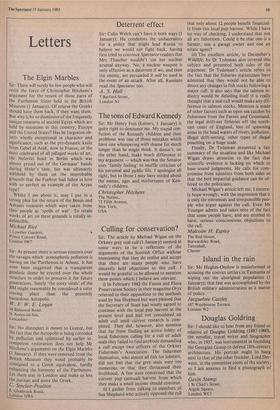Culling for conservation?
Sir: The article by Michael Wigan on the Orkney grey seal cull (1 January) seemed in some ways to be a reflection of the arguments of the Scottish Office without mentioning that they do realise and accept that there are many people who have sincerely held objections to this cull. I would be grateful to be allowed to mention three points which I believe are relevant.
i) In February 1982 the Fauna and Flora Preservation Society in their magazine Oryx referred to their opposition to the methods used by Sea Shepherd but were pleased that the Secretary of State had wisely agreed to continue with the local pup harvest at the present level and had not considered an adult cull until current research is com- pleted. They did, however, also mention that far from finding an active lobby of local fishermen calling for a cull of adult seals they failed to find anybody demanding a cull except two officers of the Orkney Fishermen's Association. The fishermen themselves, who almost all fish for lobsters, did not feel that the grey seals were too numerous or that they threatened their livelihood. A few were concerned that the current pup (annual) harvest from which they make a small income should continue.
ii) I gather from talking to members of Sea Shepherd who actively opposed the cull that only about 12 people benefit financial- ly from this local pup harvest. While I have no way of checking, I understand that not all are fishermen. Could it be that one is a farmer, one a garage owner and one an estate agent?
iii) The excellent article, in December's Wildlife, by Dr Tydeman also covered this subject and presented both sides of the argument. Dr Tydeman's article refers to the fact that the fisheries statisticians have admitted that they would not be able to detect any changes in fish stocks following a major cull. It also says that the salmon in- dustry would be deluding itself if it really thought that a seal cull would make any dif- ference to salmon stocks. Mention is made of other factors such as open sea catches by fishermen from the Faroes and Greenland, the legal drift-net fisheries off the north- east coast of England, loss of spawning areas in the head waters of rivers, pollution, illegal drift-netting, other types of illegal poaching on a huge scale.
Finally, Dr Tydeman presented a fair summary of the situation and like Michael Wigan draws attention to the fact that scientific evidence is lacking on which to base sound judgments. He calls for com- promise from scientists from both sides so that the best impartial guidance can be of- fered to the politicians.
Michael Wigan's article left me, I sincere- ly hope wrongly, with the impression that it is only the extremists and irresponsible peo- ple who argue against the cull. Even Mr Younger admits and takes note of the fact that some people have, and are entitled to have, serious conscientious objections to the cull.
Malcolm H. Espley
The Red House, Burwardsley Road, Tattenhall, Chester






































 Previous page
Previous page